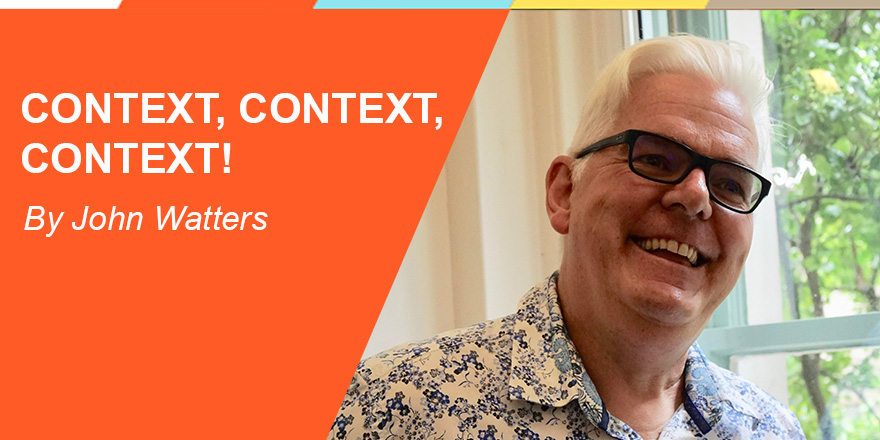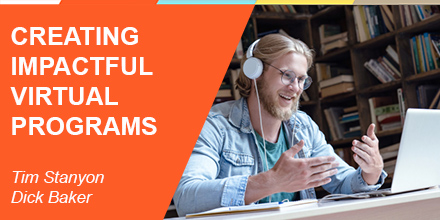

We have all become very familiar with on-line meetings in recent weeks – perhaps too familiar for some! But designing and delivering impactful learning and development experiences requires more than just the ability to host an effective meeting or to replicate what might have been done at a face-to-face session. In this article we look at what conditions are necessary to create impactful learning on-line, particularly where the intended outcomes of the learning are beyond skills transfer and have at their heart the holistic development of the learner in the realms of “being” and well as “doing”, vertical as well as horizontal development.
As with any learning experience creating an environment where people feel safe to experiment, feel supported, be challenged and feel connected with their own learning goals and those of their fellow learners is vital. In face-to-face learning facilitators work to develop that at the start of the session and where possible before the session. The same is absolutely true for on-line learning. Therefore it is important to build a community of learners of those “faces on the screen” by bringing them into the group in a way that encourages them to be real, to acknowledge their concerns and their hopes. We do that by the simple measure of firstly having everyone speak into the session as quickly as possible to have their voices heard and then recognising the need for a more intimate connection breaking larger groups into small learning sets (typically 4-6) facilitated by one of us to encourage a deeper (but quite speedy) level of connection.
Scepticism about the environment may well be a starting point for some and while we might expect this to reduce given recent accelerated exposure to on-line environments, we always give space for that and other concerns about the learning to be aired – often by explicitly asking participants what they are thinking but haven’t yet said. Giving space to this is often enough to reduce its potential as a blocker to learning.
“Thank you for a great training session yesterday, it was very stimulating and I am looking forward to doing the inter-modular work. It is not easy to keep everyone engaged during a webcast and 3 hours is a big chunk of time to keep 14 people so interested!” (Philips participant after on-line session)
We focus the time together to be more of a lab, where participants can practice and experiment, and reduce the amount of theoretical input to a minimum preferring to share that information ahead of the virtual contact session and strongly encouraging participants to study this. This follows our developmental learning approach where only about 10% of the time is spent on traditional learning (presenting models/theory, reading, videos, etc). Of course company cultures may play a part here so we try to judge how much “nudging” or “encouragement” will be needed to get a high take-up of this pre-work and use influential voices within the organisation to re-enforce our own communications. However it remains a potential issue and so we often include brief “summaries” of key models in the sessions to refresh those who have studied beforehand and at least to give an introduction to the materials for those that haven’t and thus reduce their sense of being lost! We make the contact sessions more about working with the material, dealing with questions,encouraging participants to share experiences of application in their environment and relating it to issues they are facing at the time. We will also supplement this with our own illustrations from other relevant organisations we work with.
This leaves space for learning and developing through others (peers) and we use a combination of work in learning groups (4-6), trios and pairs using break-out group on-line functionality.It is key to design effective connection and continued engagement into the overall program beyond the contact sessions, just as you would hope to do so in more traditional physical presence learning. To do that it is essential to build the learning community especially in the peer learning sets and to establish connection in the initial virtual session. By engaging the small sets in activities where they share experiences and learn together alongside an opportunity to make explicit their learning goals and to enrol each other as a peer support and challenge self-managed group we build that community which is a crucial component. With that begun well the learning between contact sessions, supported by written and other learning support components goes a long way in creating the peer learning set as a key foundational element to the overall learning program.
There are a few simple practical measures to take to improve effectiveness virtually. We find that shorter plenary sessions, more work in groups and more, shorter, breaks than would be the case in face to face sessions works well. Not only does this provide “punctuation” points but also encourages people to move their bodies and not sit hunched over the screen for hours together (important for overall well-being but also a real aid to concentration). Wherever possible we also use the features of the technology to have active engagement e.g. whiteboards for mutual brainstorming or even getting participants to describe themselves by placing a “marker” on simple spectrums of experience. All of this and more retains engagement by having active participation and reduces the danger of participants becoming distracted by the all too available phone or emails.
We encourage as much dialogue as possible especially in small group sessions. Even in plenary it is good to take advantage of the “chat” function for questions and comments to be captured in parallel during an input session and then to use these to address real points of interest and address real learning needs.
The virtual environment offers other advantages. The session can be spread over days or weeks which is not normally possible when face-to-face. Those sessions can be interspersed with learning material, practice exercises and applying learning to live issues. Wherever possible we recommend designing learning and development around these real organisational issues. We always advocate learning through experience working on individual and/or team challenges with real live issues.
We believe embodied practices are always an important part of learning and more than ever this is true online where we are physically not connected. We also use periods of silence for reflection, sometimes adding a period of quiet journaling to enable participants to better engage with what is being shared. We also extensively use body-work, such as centring, together with simple mindfulness practices of focussing attention. We are also now using more systemic mapping techniques online where we can constellate issues, from an individual challenge to representing larger system changes. With careful set up and expert facilitation a great deal can be achieved in these domains. The need to provide a mix of activities engaging the whole person and taking into account differing learning preferences is even more important in the virtual world where “mood” and “feedback”, so much easier to detect in face to face sessions, is harder to read. So anticipating the potential boredom or fluctuating engagement by deliberately designing a variety of modes of learning is another key to success.
It is vital to build a learning community by establishing an effective learning environment. Use the technology to its fullest but don’t make it the centre – in some ways it’s best if it is largely invisible to participants. Design shorter bursts and a variety of modes into the program anticipating the need to retain engagement in a world full of distractions. But finally don’t feel constrained in the virtual world – with excellent design and facilitation the only limit is your ambition.
In the next article in this series we dive deeper into how to achieve more impactful and transformational learning online, something many argue is much harder than face-to face.
Tim Stanyon and Dick Baker – Future Considerations
Future Considerations Ltd
29 Adonis Street, Acropolis
Subdivision, Libis,
Quezon City,
Philippines 1110
Jon’s early career designing applications led to him becoming IT director for a market-leading multinational. His systemic perspective, allied with a background in psychology and subsequent leadership experience inside major organisations was followed by intensive learning in personal development, values systems and multiple intelligences. Brought together, these create a transformational perspective for understanding and developing organisations as living systems. Jon is a master trainer in Spiral Dynamics, a founder director of the UK chapter of Conscious Capitalism and a certified Spiritual Intelligence coach. He is the author of several books and articles and is developer of Relational Being, a visionary whole systems approach to evidence-based spirituality, complexity science, human emergence, societal change and conscious business. This breadth of experience and deep understanding informs his work as a consultant, coach, trainer and facilitator.